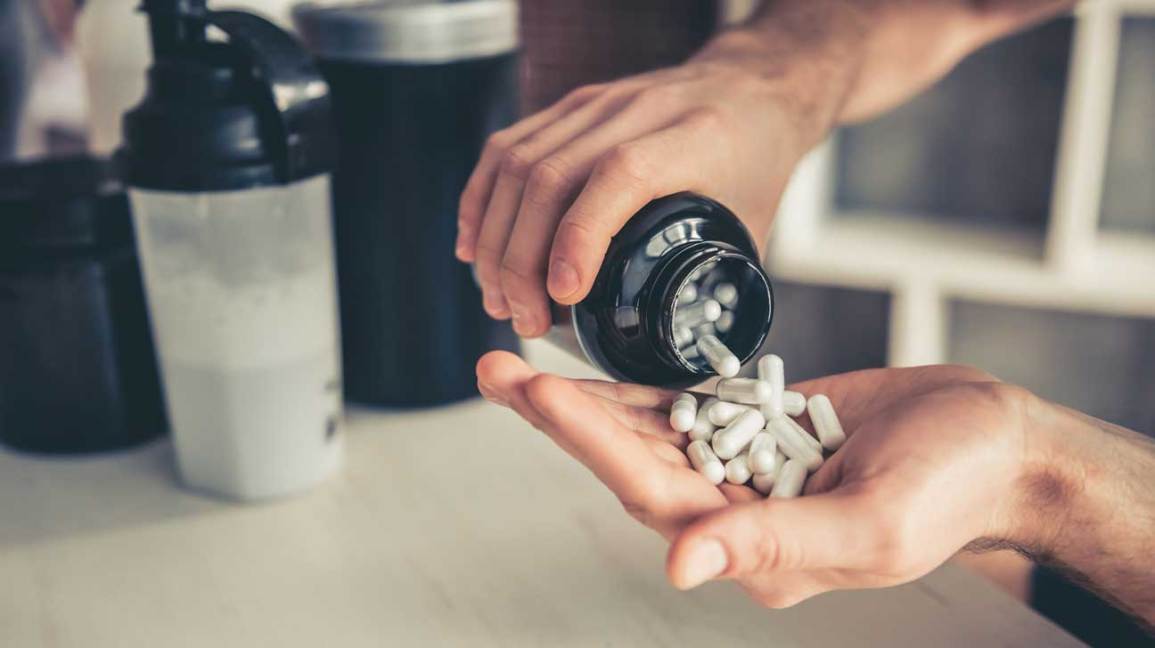I’ve been homeless and had nothing to eat for a period in my life. I’m still about as broke as one can get and I still gladly want to support Dream’s work.
Soooooo…
Creatine Synthesis
any guesses anyone?
tries to bring back the topic on track
that explains your beard



good job Zen, i was drawing a blank trying to think of a related question lol
Creatine is the number-one supplement for improving performance in the gym.
Studies show that it can increase muscle mass, strength and exercise performance (1Trusted Source, 2Trusted Source).
Additionally, it provides a number of other health benefits, such as protecting against neurological disease (3Trusted Source, 4Trusted Source, 5Trusted Source, 6Trusted Source).
Some people believe that creatine is unsafe and has many side effects, but these are not supported by evidence (7, 8Trusted Source).
In fact, it is one of the world’s most tested supplements and has an outstanding safety profile (1Trusted Source).
This article explains everything you need to know about creatine.
Share on PinterestWhat Is Creatine?
Creatine is a substance that is found naturally in muscle cells. It helps your muscles produce energy during heavy lifting or high-intensity exercise.
Taking creatine as a supplement is very popular among athletes and bodybuilders in order to gain muscle, enhance strength and improve exercise performance (1Trusted Source).
Chemically speaking, it shares many similarities with amino acids. Your body can produce it from the amino acids glycine and arginine.
Several factors affect your body’s creatine stores, including meat intake, exercise, amount of muscle mass and levels of hormones like testosterone and IGF-1 (9Trusted Source).
About 95% of your body’s creatine is stored in muscles in the form of phosphocreatine. The other 5% is found in your brain, kidneys and liver (9Trusted Source).
When you supplement, you increase your stores of phosphocreatine. This is a form of stored energy in the cells, as it helps your body produce more of a high-energy molecule called ATP.
ATP is often called the body’s energy currency. When you have more ATP, your body can perform better during exercise (9Trusted Source).
Creatine also alters several cellular processes that lead to increased muscle mass, strength and recovery (1Trusted Source, 2Trusted Source).
SUMMARY
Creatine is a substance found naturally in your body — particularly in muscle cells. It is commonly taken as a supplement.
How Does It Work?
Creatine can improve health and athletic performance in several ways.
In high-intensity exercise, its primary role is to increase the phosphocreatine stores in your muscles.
The additional stores can then be used to produce more ATP, which is the key energy source for heavy lifting and high-intensity exercise (10Trusted Source, 11Trusted Source).
Creatine also helps you gain muscle in the following ways:
- Boosted workload: Enables more total work or volume in a single training session, which is a key factor in long-term muscle growth (12Trusted Source).
- Improved cell signaling: Can increase satellite cell signaling, which aids muscle repair and new muscle growth (13Trusted Source).
- Raised anabolic hormones: Studies note a rise in hormones, such as IGF-1, after taking creatine (14Trusted Source, 15Trusted Source, 16Trusted Source).
- Increased cell hydration: Lifts water content within your muscle cells, which causes a cell volumization effect that may play a role in muscle growth (17Trusted Source, 18Trusted Source).
- Reduced protein breakdown: May increase total muscle mass by reducing muscle breakdown (19Trusted Source).
- Lower myostatin levels: Elevated levels of the protein myostatin can slow or totally inhibit new muscle growth. Supplementing with creatine can reduce these levels, increasing growth potential (20Trusted Source).
Creatine supplements also increase phosphocreatine stores in your brain, which may improve brain health and prevent neurological disease (3Trusted Source, 21Trusted Source, 22Trusted Source, 23Trusted Source, 24Trusted Source).
SUMMARY
Creatine gives your muscles more energy and leads to changes in cell function that increase muscle growth.
Effects on Muscle Gain
Creatine is effective for both short- and long-term muscle growth (25Trusted Source).
It assists many different people, including sedentary individuals, older adults and elite athletes (17Trusted Source, 25Trusted Source, 26Trusted Source, 27Trusted Source).
One 14-week study in older adults determined that adding creatine to a weight-training program significantly increased leg strength and muscle mass (27Trusted Source).
In a 12-week study in weightlifters, creatine increased muscle fiber growth 2–3 times more than training alone. The increase in total body mass also doubled alongside one-rep max for bench press, a common strength exercise (28Trusted Source).
A large review of the most popular supplements selected creatine as the single most beneficial supplement for adding muscle mass (1Trusted Source, 25Trusted Source).
SUMMARY
Supplementing with creatine can result in significant increases in muscle mass. This applies to both untrained individuals and elite athletes.
Effects on Strength and Exercise Performance
Creatine can also improve strength, power and high-intensity exercise performance.
In one review, adding creatine to a training program increased strength by 8%, weightlifting performance by 14% and bench press one-rep max by up to 43%, compared to training alone (29Trusted Source).
In well-trained strength athletes, 28 days of supplementing increased bike-sprinting performance by 15% and bench-press performance by 6% (30Trusted Source).
Creatine also helps maintain strength and training performance while increasing muscle mass during intense over-training (31Trusted Source).
These noticeable improvements are primarily caused by your body’s increased capacity to produce ATP.
Normally, ATP becomes depleted after 8–10 seconds of high-intensity activity. But because creatine supplements help you produce more ATP, you can maintain optimal performance for a few seconds longer (10Trusted Source, 11Trusted Source, 32Trusted Source, 33Trusted Source).
SUMMARY
Creatine is one of the best supplements for improving strength and high-intensity exercise performance. It works by increasing your capacity to produce ATP energy.
ADVERTISEMENT
Weight management options have evolved
Take our quiz to learn more about techniques and tips that will help you achieve your goals.
Impact on Your Brain
Just like your muscles, your brain stores phosphocreatine and requires plenty of ATP for optimal function (21Trusted Source, 22Trusted Source).
Supplementing may improve the following conditions (3Trusted Source, 24Trusted Source, 34Trusted Source, 35Trusted Source, 36Trusted Source, 37Trusted Source, 38Trusted Source, 39Trusted Source):
- Alzheimer’s disease
- Parkinson’s disease
- Huntington’s disease
- Ischemic stroke
- Epilepsy
- Brain or spinal cord injuries
- Motor neuron disease
- Memory and brain function in older adults
Despite the potential benefits of creatine for treating neurological disease, most current research has been performed in animals.
However, one six-month study in children with traumatic brain injury observed a 70% reduction in fatigue and a 50% reduction in dizziness (40Trusted Source).
Human research suggests that creatine can also aid older adults, vegetarians and those at risk of neurological diseases (39Trusted Source, 41Trusted Source).
Vegetarians tend to have low creatine stores because they don’t eat meat, which is the main natural dietary source.
In one study in vegetarians, supplementing caused a 50% improvement in a memory test and a 20% improvement in intelligence test scores (21Trusted Source).
Although it can benefit older adults and those with reduced stores, creatine exhibits no effect on brain function in healthy adults (42Trusted Source).
SUMMARY
Creatine may reduce symptoms and slow the progression of some neurological diseases, although more research in humans is needed.
Other Health Benefits
Research also indicates that creatine may (5Trusted Source, 27Trusted Source, 43Trusted Source, 44Trusted Source, 45Trusted Source, 46Trusted Source, 47Trusted Source, 48Trusted Source):
- Lower blood sugar levels
- Improve muscle function and quality of life in older adults
- Help treat non-alcoholic fatty liver disease
However, more research in these areas is needed.
SUMMARY
Creatine may combat high blood sugar and fatty liver disease, as well as improve muscle function in older adults.
Different Types of Supplements
The most common and well-researched supplement form is called creatine monohydrate.
Many other forms are available, some of which are promoted as superior, though evidence to this effect is lacking (1Trusted Source, 7, 49Trusted Source).
Creatine monohydrate is very cheap and is supported by hundreds of studies. Until new research claims otherwise, it seems to be the best option.
SUMMARY
The best form of creatine you can take is called creatine monohydrate, which has been used and studied for decades.
Dosage Instructions
Many people who supplement start with a loading phase, which leads to a rapid increase in muscle stores of creatine.
To load with creatine, take 20 grams per day for 5–7 days. This should be split into four 5-gram servings throughout the day (1Trusted Source).
Absorption may be slightly improved with a carb- or protein-based meal due to the related release of insulin (50Trusted Source).
Following the loading period, take 3–5 grams per day to maintain high levels within your muscles. As there is no benefit to cycling creatine, you can stick with this dosage for a long time.
If you choose not to do the loading phase, you can simply consume 3–5 grams per day. However, it may take 3–4 weeks to maximize your stores (1Trusted Source).
Since creatine pulls water into your muscle cells, it is advisable to take it with a glass of water and stay well hydrated throughout the day.
SUMMARY
To load with creatine, take 5 grams four times per day for 5–7 days. Then take 3–5 grams per day to maintain levels.
Safety and Side Effects
Creatine is one of the most well-researched supplements available, and studies lasting up to four years reveal no negative effects (8Trusted Source, 51Trusted Source).
One of the most comprehensive studies measured 52 blood markers and observed no adverse effects following 21 months of supplementing (8Trusted Source).
There is also no evidence that creatine harms the liver and kidneys in healthy people who take normal doses. That said, those with preexisting liver or kidney problems should consult with a doctor before supplementing (8Trusted Source, 51Trusted Source, 52Trusted Source).
Although people associate creatine with dehydration and cramps, research doesn’t support this link. In fact, studies suggest it can reduce cramps and dehydration during endurance exercise in high heat (53Trusted Source, 54Trusted Source).
SUMMARY
Creatine exhibits no harmful side effects. Though it’s commonly believed to cause dehydration and cramps, studies don’t support this.
The Bottom Line
At the end of the day, creatine is one of the cheapest, most effective and safest supplements you can take.
It supports quality of life in older adults, brain health and exercise performance. Vegetarians — who may not obtain enough creatine from their diet — and older adults may find supplementing particularly useful.
Creatine monohydrate is likely the best form. Try out creatine today to see if it works for you.
Exactly.
YOU HAD that prepareD!
I used creatine 20mg for a week and I was SOOO pumped. Legit looked like i was on drugs or someshit.
Yeah, quite a bit of it is for charity work as well.

lol Zen, that’s why i’m using a 3 hour brain stack everyday lol
3 hours? I wish I had that time lol.
I went to Patreon to download some detox audios and then after the page loaded, I saw the cat artwork.
I’m like “shit what did dream do for us now?”
Thanks Cap
It’s my fav thing about being a medic. Half the time I’m not on calls, and when I am I have one air pod in my ear. If I had an office job, my stack would be way smaller.
Exactly, you don’t need to sit and do nothing while listening
Yeah awesome how you can listen passively. When I was a beginner, I had to focus more.
I agree.
Sapien could earn a lot more by making customs or working with famous and rich persons.
nice
Ah okay cool, if you don’t mind me asking, what type of doctor are you?

